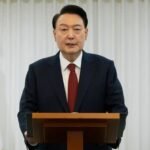By Charles Obiajulu Ugwu-PhD
There comes a moment in a nation’s life when the air thickens with a kind of dread no one wants to name. You feel it in the strained politeness of everyday conversations, in the sudden temper of men who once waited their turn in silence, in the way mothers clasp their children at night as if the walls have grown porous. Nigeria has reached that moment. We have been drifting toward it for years, rehearsing denial like a national rite. But something has shifted. What was once slow corrosion now feels like the metallic groan of a structure about to give way.
If Nigerians appear unbothered on the surface laughing at their pain, mocking their leaders, praying through disaster it is not resilience. It is shock, ossified. You can only take so many blows before you become accustomed to bleeding.
And yet, beneath this strange quiet, the ground is trembling.
The system that feeds on its own rot
It is fashionable to blame “failure of leadership,” “lack of planning,” “corruption,” or whatever new slogan happens to trend. But these are symptoms, not origins. Nigeria’s dysfunction has matured into a sophisticated ecosystem that is self-preserving, deeply networked, and profitable for those perched comfortably above the suffering.
You know this if you have ever stood in a government office where the printer mysteriously stops working until a bribe is offered, only for it to resurrect instantly. Or if you have driven past a police checkpoint and noticed the officer’s sudden politeness when he spots the logo of a big man’s company on your windshield. The system bends, not because it is weak, but because it has learned to yield only to those who matter.
In Nigeria, public hardship is collateral damage for private ambition.
The economic deprivations grinding millions into dust do not jolt the powerful into action; they serve as leverage. Poverty is currency. Desperation is a political tool.
While entire communities ration hope the way they now ration food and fuel, the ruling class is fixated on 2027 calculating alliances, bargaining with factions, fencing off their interests. The insecurity that has turned highways into hunting grounds and farmlands into graveyards is treated with the emotional urgency of a weather forecast. Tragedy is background noise. Governance is theatre.
Everywhere you look, you see fractures hardening into normalcy: bandits negotiating from positions of strength, militants receiving quiet pardons, known vandals integrated back into society because they serve someone’s agenda. Meanwhile, voices demanding equity or regional justice are silenced with the ferocity reserved for existential threats.
This is not chaos; it is choreography.
The calcified nodes of power
Nations don’t collapse because bad things happen; they collapse because certain groups benefit from things remaining bad.
To understand today’s Nigeria, think of a household where termites have eaten through the wooden beams. The house still stands. People still live in it. But every step sends dust falling from the ceiling. You don’t need to be an engineer to sense that the structure is now negotiating with gravity.
Nigeria’s termites are not invisible. They wear agbada, uniforms, titles, and sometimes clerical collars. They occupy offices where crises should be solved but where crises are instead converted into revenue streams. Kidnapping sprees enrich intermediaries. Inflation fattens those who manipulate foreign exchange. Insecurity justifies inflated budgets. Poverty births dependency. Everything has been weaponized for advantage.
Meanwhile, the ordinary citizen has become a statistic that bleeds quietly: the farmer abducted on his way to irrigation, the teacher funding her school from her meagre salary, the family extinguished by a stray bullet, the university graduate hawking recharge cards at traffic lights. Each casualty is a footnote in someone else’s balance sheet.
The state is present, only not where it should be.
It is present when it wants to enforce silence.
Absent when it ought to uphold dignity.
The country of endless funerals
One of the most telling anecdotes of our decline came from a man travelling from Kaduna to Abuja. He described passing four scenes of violence in one journey: a burnt vehicle still smoking, a freshly abandoned roadblock, a group of villagers crying beside an empty police truck, and a convoy of powerful politicians speeding toward the capital, sirens blaring. None of them stopped. Not even the security men escorting them.
He said he felt like he was watching two countries that no longer recognized each other.
Another woman from Imo told the story of her brother who was arrested for protesting unpaid salaries while known killers in the area received “reintegration payouts” after allegedly repenting. The message was clear: righteousness is a liability; violence is a negotiation tactic.
What do you call a republic where speaking up is punished more brutally than taking up arms?
What do you call a nation where dissent is treated as a crime and brutality is rewarded with compensation?
Nigeria has become a state where moral logic has been inverted.
The righteous are endangered.
The powerful are insulated.
The guilty are occasionally celebrated.
When the elasticity of a people snaps
For decades, analysts and politicians have marveled at the “resilience” of Nigerians. They say the people can endure anything: military rule, fuel scarcity, currency collapse, price hikes, collapsed infrastructure, stolen futures.
But what they call resilience is a misdiagnosis; it is accumulated fatigue disguised as endurance.
There is a limit to the elasticity of any people. And when that limit is breached, societies erupt—not out of ideology, but out of accumulated insult.
It took a fruit vendor in Tunisia, Mohamed Bouazizi—humiliated, slapped, and stripped of dignity—to set himself ablaze. That single fire triggered the Arab Spring, toppling governments in a chain reaction across the region.
Nigeria today resembles a country rehearsing that kind of ignition without realizing it.
Every region is nursing injuries:
– The North bleeding from banditry and famine.
– The South-East suffocating under militarization and marginalization.
– The South-West frustrated by economic mismanagement and crumbling urban centers.
– The Niger Delta abandoned to pollution and broken promises.
When a nation is this bruised, it doesn’t take a revolution; it takes a spark.
The gathering cloud
Our leaders misread the signs. They believe silence equals docility. They confuse exhaustion with apathy. They mistake the quiet for consent.
But the cloud is gathering.
And it is not the kind that brings nourishing rain.
It is the kind that scorches what is already scorched—leaving a harsher, more brittle landscape behind. A landscape where narratives crack, alliances dissolve, and institutions fail their own weight test.
The question is not whether something will give.
The question is what will remain when it does.
The nation at a crossroads
We can still avert the future that is rushing toward us. But it requires abandoning the comfortable fictions we tell ourselves: that elections will fix things, that leadership will suddenly find conscience, that reforms will come from those who profit most from disorder.
Real change requires pressure not poetic appeals. Pressure that rearranges incentives, that forces accountability, that dismantles the lucrative networks that feed on national decay.
It means building civic coalitions that outlive hashtags.
It means demanding institutions that are loyal to the constitution, not personalities.
It means refusing the emotional blackmail of ethnic guilt.
It means insisting on justice where it has been rationed like charity.
And above all, it means recognizing that Nigeria will not be saved by those who benefit from its dysfunction.
It will be saved if at all possibly by those who have nothing left to lose.
The conversation that must not end
A nation can collapse quietly.
Many do.
Sometimes the implosion is not announced with explosions but with the soft, terrible sound of a people giving up on themselves.
Nigeria is not there yet. But we are closer than we have ever been.
This essay is not a prophecy; it is a warning. A plea. A mirror held up to a country running out of time. What happens next will depend on whether Nigerians decide that this slow descent is acceptable—or whether we will gather the courage to confront the architects of this decline.
The debate must continue because the alternative is silence.
And silence, in moments like this, is another form of surrender.
The question echoing across the land is simple:
How much longer can a people endure a system that pretends not to hear the sound of its own collapse?
The answer will define the next century of Nigeria’s existence—if there is one.
About the Author
Dr. Charles Obiajulu Ugwu is a contrarian thinker, creative philosopher, and systems analyst whose work focuses on dissecting the unnoticed delusions that underpin modern human institution.



























